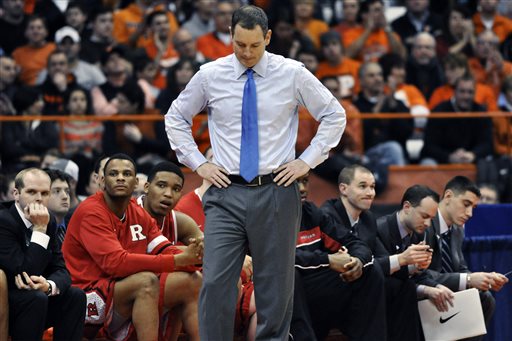By MATT ROSENFELD
SPORTS EDITOR

I love my home state of New Jersey. I love that people poke fun at me for being from the Garden State because I know how great it really is.
Unfortunately, over the past week, Rutgers, the state university of New Jersey, has been in the news for all the wrong reasons.
The Scarlet Knights’ men’s basketball program came under fire when practice tapes surfaced that showed head coach Mike Rice abusing his players in practice. In the video, Rice can be seen throwing basketballs at player’s bodies and heads, aggressively grabbing players and calling others wildly inappropriate names. Since the videos became national news, Rice has been fired, and Rutgers Athletic Director Tim Pernetti resigned.
When the evidence of Rice’s actions was brought to Pernetti’s attention in December, he chose to fine Rice $50,000 dollars and to suspend the coach for three games. That was supposed to be the end of it, but when the videos leaked out to the national media, the story became huge and the backlash even larger.
I’m not going to condone what Rice did to his players. If you watch the video, he does things that are unacceptable and downright wrong.
Still, Mike Rice should not have been fired for this “scandal.”
Initially, when this story came out, I sided with the majority. “He had to be fired. That behavior is ridiculous,” is what I thought. The more I read, and the more I thought about my experience with sports and coaches, the more I found myself seeing how overblown this story had gotten.
It’s a well-known fact to anybody that has played sports on a competitive level that coaches can have short tempers. They yell. They get frustrated. They scream. No, they don’t usually throw basketballs at players, but are we going to judge this man off of a tape of all his worst moments? That tape is a compilation of all of Rice’s worst actions in practice. It was a low-light reel. Is that really fair? Didn’t he pay for his actions with the suspension and the fine? That tape was a cut up of different practices throughout the three years Rice was there. I’m sure he hasn’t thrown a basketball at anybody since that suspension.
The turning point for me is when I read a story in which two of his players came out and defended him.
Junior forward Wally Judge and sophomore forward Austin Johnson spoke out in their coach’s defense.
“You can’t let those individual moments define what he was,’’ Judge said to the Associated Press. ‘’In my past two years, me being an older guy and being under other coaches, I have grown from the moment I stepped in these doors, not only as a player but also as a person because of how he has treated me.’’
College coaches have much larger roles than winning and losing games. They take in 18-year-old kids and play a large role in turning them into mature men and women. That counts more for basketball, where there are only 15 players to a team, and each relationship between coach and player is more developed and personal than in larger team sports like football.
Different coaches have different relationships with their teams. Some coaches, like Rice, use a tougher approach on the court. Just because he got out of line doesn’t mean he’s the next coming of Satan like every story will have you believe. The man is intense. Aren’t all the successful coaches that do this kind of stuff revered?
‘’Honestly, a lot of the things that have been seen have been taken out of context,” Judge said. ‘’Mike was almost like a big brother. He would get on the floor with us and go through drills with us. He made it fun. When you have a big brother type of figure, you know you can play around like that. I have grabbed Mike and put him in a headlock, and we joke around and kid. That was the type of relationship he built with his players. He wasn’t a guy we hated or despised.”
I realize the video is incriminating, but it’s a pretty strong message when Rice’s players, the ones who are supposedly the “victims” here, come out in defense of their coach. Mike Rice’s fate has been sealed, and it’s not like he was winning championships at Rutgers, but the next time an issue like this comes to light, can we not immediately overreact? We all certainly did in this case.





































































































































































































